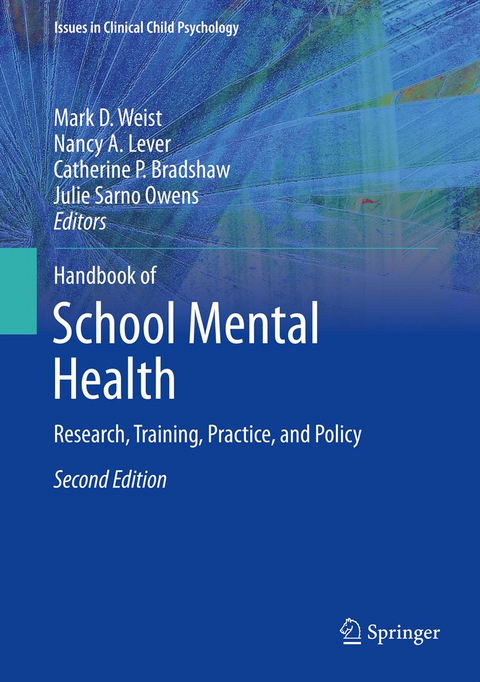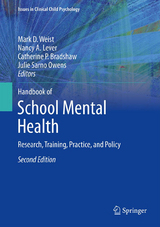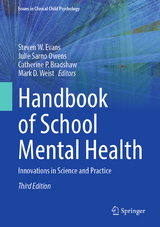Handbook of School Mental Health
Springer-Verlag New York Inc.
978-1-4614-7623-8 (ISBN)
Like its acclaimed predecessor, the Second Edition of the Handbook of School Mental Health offers ways for professionals to maximize resources, make and strengthen valuable connections, and attain more effective school-based services and programming. At the same time, the Handbook provides strategies and recommendations in critical areas, such as workforce development, interdisciplinary collaborations, youth/family engagement, consultation, funding, and policy concerns, summarizes the state of current research, and offers directions for further study. Chapters model best practices for promoting wellness and safety, early detection of emotional and behavioral problems, and school-based interventions for students with anxiety, depression, attention deficit hyperactivity disorder, and other common challenges. In spotlighting this range of issues, the contributors have created a comprehensive game plan for advancing the field.
Among the Handbook's topics:
Pre-service training for school mental health clinicians.
Cognitive-behavioral interventions for trauma in schools.
Increasing parental engagement in school-based interventions.
Models of psychiatric consultation to schools.
Culturally competent behavioral and emotional screening.
Bullying from a school mental health perspective.
Prevention and intervention strategies related to a variety of mental health problems in schools.
The Second Edition of the Handbook of School Mental Health is an essential reference for researchers, graduate students, and other professionals in child and school psychology, special and general education, public health, school nursing, occupational therapy, psychiatry, social work and counseling, educational policy, and family advocacy.
Mark D. Weist. Ph.D., received his doctorate in clinical psychology from Virginia Tech and is currently a Professor in the Department of Psychology at the University of South Carolina. He was on the faculty of the University of Maryland School of Medicine (UMSM) for 19 years where he helped to found and directed the Center for School Mental Health, currently the only federally funded center providing leadership to the advancement of school mental health (SMH) policies and programs in the United States. He has led a number of federally funded research grants, has advised national research and policy oriented committees, has testified before Congress, and presented to the President’s New Freedom Commission on Mental Health. He helped to found the International Alliance for Child and Adolescent Mental Health in Schools (INTERCAMHS). Dr. Weist has edited six books and has published and presented widely in the SMH field and in the areas of trauma, violence and youth, evidence-based practice, and cognitive behavioral therapy. With colleagues from the Clifford Beers Foundation and the UMSM, he started the journal, Advances in School Mental Health Promotion. Nancy A. Lever, Ph.D., received her doctorate in clinical psychology from Temple University and completed her psychology internship and postdoctoral fellowship at the University of Maryland School of Medicine (UMSM). In 1998 she joined the Division of Child and Adolescent Psychiatry at UMSM as a faculty member and currently is an Associate Professor. She provided school mental health (SMH) services within a dropout prevention program for 10 years and facilitates a national practice group on connecting SMH with juvenile justice and dropout prevention. Dr. Lever directs two SMH programs in Baltimore City. In 1996, she joined the Center for School Mental Health (CSMH), a national resource center for advancing SMH research, training, policy, and practice. She served for many years as the CSMH Director of Training and Outreach. In July 2010, she was appointed the Co-Director of the CSMH. She helps to facilitate the National Community of Practice on Collaborative School Behavioral Health and represents the CSMH on local, state, and national committees. She has been a driving force in advancing training related to SMH and has coordinated training experiences for psychology interns, psychiatry fellows, postdoctoral fellows and SMH professionals. She has presented and written extensively about SMH and is co-editor of the first edition of the Handbook of School Mental Health. Catherine Bradshaw, Ph.D., M.Ed. is a Professor and the Associate Dean for Research and Faculty Development at the Curry School of Education at the University of Virginia (UVA). Prior to her current appointment at UVA, she was an Associate Professor and the Associate Chair of the Department of Mental Health at the Johns Hopkins Bloomberg School of Public Health. She maintains an affiliation with Johns Hopkins as the Deputy Director of the CDC-funded Johns Hopkins Center for the Prevention of Youth Violence and Co-Director of the NIMH-funded Johns Hopkins Center for Prevention and Early Intervention. She holds a doctorate in developmental psychology from Cornell University and a master’s of education in counseling and guidance from the University of Georgia. Her primary research interests focus on the development of aggressive behavior and school-based prevention. She collaborates on federally supported randomized trials of school-based prevention programs, including Positive Behavioral Interventions and Supports (PBIS) and social-emotional learning curricula. She also has expertise in implementation science and coaching models. Dr. Bradshaw works with the Maryland State Department of Education and several school districts to support the development and implementation of programs and policies to prevent bullying and school violence, and to foster safe and supportive learning environments. She collaborates on federally-funded research grants supported by the NIMH, NIDA, CDC, and the Institute of Education Sciences. She is an Associate Editor for the Journal of Research on Adolescence and the editor elect of Prevention Science. Julie Sarno Owens, Ph.D., received her doctorate in clinical psychology from Purdue University and completed her clinical internship at the University of Florida, Health Sciences Center in the rural/primary care track. Dr. Owens is an Associate Professor in the Department of Psychology at Ohio University and Co-Director of the Center for Intervention Research in Schools. Her research focuses on the development and evaluation of school-based interventions for elementary school-aged youth with attention-deficit/hyperactivity disorder (ADHD) and disruptive behavior problems. Her studies examine (a) the effectiveness and feasibility of transporting empirically-supported interventions into schools in underserved rural communities, (b) parents’ and teachers’ perceptions, satisfaction and acceptability of such treatments, and (c) factors that either enhance or interfere with the transportation, dissemination and sustainability of such treatments in rural communities. Dr. Owens is the Director of the Youth Experiencing Success in School (Y.E.S.S.) Program, a school-based mental health program that integrates evidence-based interventions for youth with ADHD into the school setting. The Y.E.S.S. Program, which has developed in the context of a 12-year university-community partnership, involves intervention development and evaluation research, and practical training opportunities for graduate and undergraduate students, professional development training for local educators and mental health professionals, and treatment services for youth in our local region. As such the work emerging from the Y.E.S.S. Program has implications for the research, practice, training, and policy agendas at the local and national level.
Commentary 1; Hill Walker.- Commentary 2; Lucille Eber.- Commentary 3; Kathy Short.- Commentary 4; Abraham Wandersman and Deborah Hamm.- Chapter 1. Introduction: Further Advancing the Field of School Mental Health; Mark D. Weist, Nancy A. Lever, Catherine P. Bradshaw, Julie Sarno Owens.- Section I. Foundations: Funding, Training, and Interdisciplinary Collaboration.- Chapter 2. Funding Expanded School Mental Health Programs; Nicole Cammack, Nicole Evangelista Brandt, Eric Slade, Nancy Lever, Sharon Stephan.- Chapter 3. Preparing School Mental Health Professionals: Competencies in Interdisciplinary and Cross-Systems Collaboration; Kurt D. Michael, Seth Bernstein, Julie Sarno Owens, Abby Albright, Dawn Anderson-Butcher.- Chapter 4. Pre-service Training for School Mental Health Clinicians; Nancy Lever, Michael Lindsey, Lindsey Grimm, Mark D. Weist.- Chapter 5. Effective School Teams: Benefits, Barriers, and Best Practices; Robert S. Markle, Joni W. Splett, Melissa A. Maras, Karen J. Weston.- Chapter 6. Advancing School Mental Health in Montana: Partnership, Research, and Policy; Erin Butts, Sara Casey, Carol Ewen.- Chapter 7. Building Bridges: The Role of Expanded School Mental Health in Supporting Students with Emotional and Behavioral Difficulties in the Least Restrictive Environment; Carrie Mills, Dana Cunningham.- Section II. Prevention and Mental Health Promotion.- Chapter 8. The Integration of Positive Behavioral Interventions and Supports and Social and Emotional Learning; Catherine P. Bradshaw, Jessika H. Bottiani, David Osher, George Sugai.- Chapter 9. Promoting Mental Health in Early Childhood Programs: Serving Low-income Ethnic Minority Families; Debra Gross, Susan Breitenstein, Shelly Eisbach, Emily Hoppe, Joyce Harrison.- Chapter 10. Promoting Social Competence and Behavioral Health in At-risk Youth: Implementation and Efficacy of Primary and Secondary Prevention Programs in Schools; Brian Daly, Elizabeth Nicholls, Richa Aggarwal, Mark Sander.- Chapter 11. Effects of Trauma on Students: Early Intervention through Cognitive Behavioral Intervention for Trauma in Schools; Erum Nadeem, Lisa H. Jaycox, Audra K. Langley, Marleen Wong, Sheryl H. Kataoka, Bradley D. Stein.- Chapter 12. The Connection Between Out-of-School Time Programs and School Mental Health; Aidyn L. Iachini, Dawn Anderson-Butcher.- Chapter 13. Better Understanding and Intervening to Prevent Relational Aggression; Stephen S. Leff, Tracy Evian Waasdorp, Christine Waanders, Brooke S. Paskewich.- Section III. Youth and Family Engagement and Empowerment.- Chapter 14. Partnering with Youth in School Mental Health: Recommendations from Students; Kendra P. DeLoach, Melissa W. George, Emily Mancil, Leslie K. Taylor, Carl Paternite, Mark D. Weist.- Chapter 15. Strengthening the Components and Processes of Family Involvement in School Mental Health; Heather L. McDaniel, Bryn E. Schiele, Leslie K. Taylor, Jill Haak, Mark D. Weist.- Chapter 16. Advancing Effective Family-School-Community Partnerships; Nicole Evangelista Brandt, Cynthia Glimpse, Claudette Fette, Nancy Lever, Nicole Cammack, Jennifer Cox.- Chapter 17. Increasing Parental Engagement in School-based Interventions using Team Engagement and Motivation Methods; Keith C. Herman, Wendy M. Reinke, Catherine P. Bradshaw, John E. Lochman, Lindsay Borden, Dana Darney.- Chapter 18. Lessons Learned from Scaling-up the Ecological Approach to Family Interventions and Treatment Program in Middle Schools; Gregory M. Fosco, John R. Seeley, Tom J. Dishion, Keith Smolkowski, Elizabeth A. Stormshak, Rosemarie Downey-McCarthy, Corrina A Falkenstein, Kevin J. Moore, Lisa A Strycker.- Section IV. Coaching and Consultation.- Chapter 19. Coaching Classroom-based Preventative Interventions; Elise T. Pas, Catherine P. Bradshaw, Anne Cash.- Chapter 20. Supporting Teachers through Consultation and Training in Mental Health; Jennifer E. Gibson, Sharon Stephan, Nicole Evangelista Brandt, Nancy Lever.- Chapter 21. Models of Psychiatric Consultation to Schools; Lois T. Flaherty.- Section V. Screening and Early Identification.- Chapter 22. School-based Screening for Mental Health in Early Childhood; Melissa R. Dvorsky, Erin Girio-Herrera, Julie Sarno Owens.- Chapter 23. Culturally Competent Behavioral and Emotional Screening; Erin Dowdy, Randy W. Kamphaus, Jennifer M. Twyford, Bridget V. Dever.- Chapter 24. Early Identification of Psychosis in Schools; Emily Kline, Danielle Denenny, Jason Schiffman, Gloria Reeves.- Section VI. Intervention for Specific Problems; Chapter 25. Bullying: A School Mental Health Perspective; Susan M. Swearer, Cixin Wang, Adam Collins, Jenna Strawhun, Scott Fluke.- Chapter 26. School-Based Treatment for Anxiety in Children and Adolescents: New Developments in Transportability and Dissemination; Jeremy K. Fox, Kathleen Herzig-Anderson, Daniela Colognori, Catherine E. Stewart, Carrie Masia Warner, Nathan S. Kline.- Chapter 27. School-based Interventions for Depression; Puja G. Patel, Kevin D. Stark, Kristina L. Metz, Kelly N. Banneyer.- Chapter 28. Organizational Interventions for Children and Adolescents with Attention-Deficit/Hyperactivity Disorder; Jennifer L. Storer, Steven W. Evans, Joshua M. Langberg.- Chapter 29. Response to Intervention for youth with Attention-Deficit/Hyperactivity Disorder: Incorporating an Evidence-Based Intervention within a Multi-tiered Framework; Rebecca K. Vujnovic, Alex S. Holdaway, Julie Sarno Owens, Gregory A. Fabiano.- Chapter 30. Toward a Comprehensive, Life Course Model of Care for Youth with Attention-Deficit/Hyperactivity Disorder; Steven W. Evans, Julie Sarno Owens, Jennifer A. Mautone, George J. DuPaul, Thomas J. Power.- Chapter 31. Classroom Interventions for Youth with Pervasive Developmental Disorders/Autism Spectrum Disorders; James E. Connell, Melanie Pellechia, Christina M. Vorndran.- Chapter 32. Supporting the Mental Health Needs of Military-Connected Students; Catherine P. Bradshaw, Kathrine E. Figel, Haley Deutsch.
| Erscheint lt. Verlag | 14.8.2013 |
|---|---|
| Reihe/Serie | Issues in Clinical Child Psychology |
| Zusatzinfo | 24 Illustrations, black and white; XXXVII, 465 p. 24 illus. |
| Verlagsort | New York, NY |
| Sprache | englisch |
| Maße | 178 x 254 mm |
| Gewicht | 1155 g |
| Themenwelt | Geisteswissenschaften ► Psychologie ► Entwicklungspsychologie |
| Geisteswissenschaften ► Psychologie ► Pädagogische Psychologie | |
| Medizin / Pharmazie ► Gesundheitswesen | |
| Medizin / Pharmazie ► Medizinische Fachgebiete ► Psychiatrie / Psychotherapie | |
| Studium ► Querschnittsbereiche ► Prävention / Gesundheitsförderung | |
| Sozialwissenschaften ► Pädagogik | |
| Sozialwissenschaften ► Soziologie | |
| Schlagworte | adaptive preventive interventions • ADHD in youth • Aggression • Anxiety Disorders • At-Risk Youth • Casel • CBT • classroom coaching • cognitive behavioral intervention • Collaborative for Academic, Social, and Emotional Learning • consultation in schools • culturally competent mental health screening • Depression • developmental trajectory • early assessment • early childhood education programs • Early Identification • early school mental health screening • EcoFIT Program • ethnic minority families • family interventions and treatment • Family involvement • funding models • high-poverty communities • individualized evidence-based care • interdisciplinary graduate training • Kinderpsychologie / Jugendpsychologie; Handbuch/Lehrbuch • Low-income families • mental health promotion • organizational interventions • parental engagement • PDDs • Pervasive Developmental Disorders • policy implications • positive behavior supports • preservice training • preventing bullying • preventing depression • preventing suicide • Preventive interventions • psychiatric consultation models • Psychische Gesundheit • psychoeducational screenings • Psychological disorders • public domain interventions • relational aggression • Response to Intervention • school-based prevention • school-family-community collaboration • school-family partnerships • Schulpsychologie • sexual risk taking • social emotional learning • Special education • SPED and RTI • systems of care • the Family Check-up • the Parent Coping Power Program • tiered prevention • training school mental health professionals • trauma in schools • treating psychosis in schools |
| ISBN-10 | 1-4614-7623-2 / 1461476232 |
| ISBN-13 | 978-1-4614-7623-8 / 9781461476238 |
| Zustand | Neuware |
| Haben Sie eine Frage zum Produkt? |
aus dem Bereich





